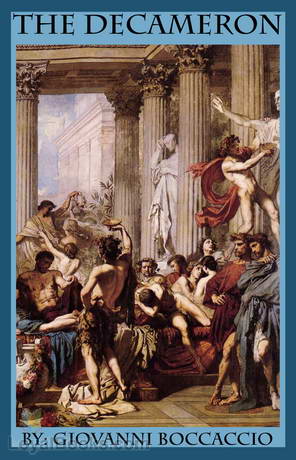
Giovanni Boccaccio’s The Decameron is a collection of novellas or short novels written during the 14th century. There are 100 tales contained in the book which is presented together. The book’s title The Decameron combines the two Greek words “deka” meaning ten and “hemera” meaning day. The title can be literally translated as “ten day,” which is also the time frame in which the stories are told by the 7 young women and 3 young men.
In the book, each of the ten persons took their turns to tell stories for a day. They did this during their stay at a villa in Fiesole in which they stayed to be safe from the Black Plague. The stories they told vary from love stories, narratives which have tragic endings to erotic tales. This book was originally written in vernacular Florentine and was subsequently translated into many different languages including English. Wayne Reborn’s recent translation of the book into English in 2013 was praised by many critics for being “modern” and it made the book more “readable” to younger audiences.
Like most of the literature from the medieval times, this book is full of symbolisms. The book’s subtitle “Prince Galehaut” is an allusion to Galehaut, a character in the tale of King Arthur who made a way for his friend Lancelot and Guinevere to meet and express their love for each other. It was believed that Boccaccio used this subtitle to express his sentiment about women during his time who have no social liberty and can’t freely express themselves. The seven young women in the book are believed to symbolize the four cardinal virtues and the three theological virtues while the three young men represent the classical belief of the Greeks in which the human soul has three parts: reason, spirit and appetite.
In the passage of time, other authors eventually borrowed the storylines of the tales told in the book. Modern readers may be amused to learn that the plots of some of the stories they know today were just borrowed from this The Decameron.

Other Audiobook
Audiobook: Bible (Reina Valera) NT 11: Filipenses
Esta cariñosa carta de Pablo elogia a los filipenses por su fe y apoyo. Les
Audiobook: Story of My Misfortunes (or: Historia Calamitatum)
Autobiographies from remote historical periods can be especially fascinating. Modes of self-presentation vary greatly across
Audiobook: Piacevoli Notti, Libro 2
“Le Piacevoli Notti” è una raccolta, in due Libri, di 74 novelle, composte dallo scrittore
Audiobook: Shakespeare Monologues
This is truly a delightful compilation of some of the best known and loved passages
Audiobook: Macdermots of Ballycloran
This is the story of the Macdermots of Ballycloran the story is about the tragic
Audiobook: Quatrains of Omar Khayyam of Nishapur
In 1906, Eben Francis Thompson,scholar and poet, published a limited edition of his translation of
Audiobook: Fire People
In effect Professor Newland declared that the curious astronomical phenomena of the previous November–the new
Audiobook: Rover Vol. 01 No. 15
“The Rover: A weekly magazine of tales, poetry and engravings, original and selected” was a
Audiobook: Meine Emancipation, Verweisung und Recht – fertigung
1845, Louise Aston lebt als geschiedene Frau in Berlin und bewegt sich in intellektuellen Kreisen.
Audiobook: Birds of the Air
Arabella Buckley had a great love of nature and wished to impart that love to
Audiobook: Mongan’s Frenzy
James Stephens is famous for his retellings of Irish myths and fairy tales. This tale
Audiobook: Shadow of a Sin (Dramatic reading)
A story of a young woman in love and the sacrifices she makes in order